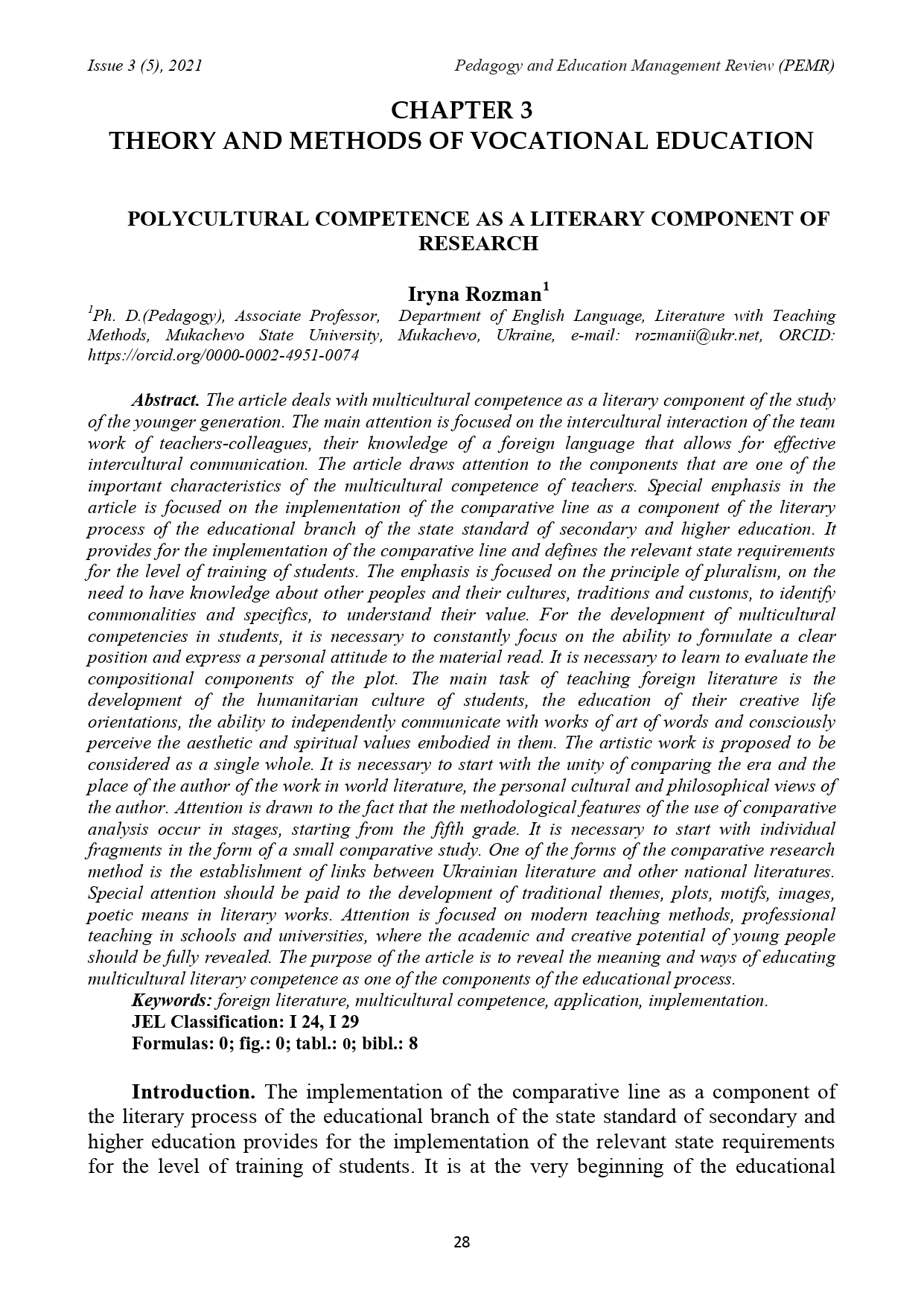POLYCULTURAL COMPETENCE AS A LITERARY COMPONENT OF RESEARCH
DOI:
https://doi.org/10.36690/2733-2039-2021-3-28Keywords:
foreign literature, multicultural competence, application, implementationAbstract
The article deals with multicultural competence as a literary component of the study of the younger generation. The main attention is focused on the intercultural interaction of the team work of teachers-colleagues, their knowledge of a foreign language that allows for effective intercultural communication. The article draws attention to the components that are one of the important characteristics of the multicultural competence of teachers. Special emphasis in the article is focused on the implementation of the comparative line as a component of the literary process of the educational branch of the state standard of secondary and higher education. It provides for the implementation of the comparative line and defines the relevant state requirements for the level of training of students. The emphasis is focused on the principle of pluralism, on the need to have knowledge about other peoples and their cultures, traditions and customs, to identify commonalities and specifics, to understand their value. For the development of multicultural competencies in students, it is necessary to constantly focus on the ability to formulate a clear position and express a personal attitude to the material read. It is necessary to learn to evaluate the compositional components of the plot. The main task of teaching foreign literature is the development of the humanitarian culture of students, the education of their creative life orientations, the ability to independently communicate with works of art of words and consciously perceive the aesthetic and spiritual values embodied in them. The artistic work is proposed to be considered as a single whole. It is necessary to start with the unity of comparing the era and the place of the author of the work in world literature, the personal cultural and philosophical views of the author. Attention is drawn to the fact that the methodological features of the use of comparative analysis occur in stages, starting from the fifth grade. It is necessary to start with individual fragments in the form of a small comparative study. One of the forms of the comparative research method is the establishment of links between Ukrainian literature and other national literatures. Special attention should be paid to the development of traditional themes, plots, motifs, images, poetic means in literary works. Attention is focused on modern teaching methods, professional teaching in schools and universities, where the academic and creative potential of young people should be fully revealed. The purpose of the article is to reveal the meaning and ways of educating multicultural literary competence as one of the components of the educational process.
Downloads
References
Ahadullin, R. R. (2004), Polikulturna osvita: metodoloho-teoretychnyi aspekt [Multicultural education: methodological and theoretical aspect]. Pedagogy and psychology. № 3. S. 18–29. [in Ukrainian].
Honcharenko, L. A., Zubko, A. M., Kuzmenko, V. V.; Kuzmenko, V. V. (Ed.). (2007), Rozvytok polikulturnoi kompetentnosti pedahohiv zahalnoosvitnikh navchalnykh zakladiv [Development of multicultural competence of teachers of secondary schools]. Kherson: RIPO. [in Ukrainian].
Danylova, D. Yu. (2007), Formyrovanye polykulturnoi kompetentnosty studentov [Formation of multicultural competence of students]. Teacher. № 3. S. 12–15. [in Russian].
Yvanova, A. V. Razvytye polykulturnoho obrazovanyia v respublyke Sakha (Iakutyia): ystoryko-pedahohycheskyi analyz (XX v. – nachalo XXI v.) [The development of multicultural education in the Republic of Sakha (Yakutia): historical and pedagogical analysis (XX century – early XXI century)]. (Abstract diss. cand. ped. sciences). Yakutsk. [in Russian].
Kovalova, V. I. (2019), Intehratsiia navchalnoho protsesu yak chynnyk rozvytku piznavalnoi aktyvnosti uchniv [Integration of the educational process as a factor in the development of cognitive activity of students]. http://osvita.ua/school/lessons_summary/initial/8032. [in Ukrainian].
Peskov, Y. V. (2009), Formyrovanye polykulturnykh kompetentsyi uchashchykhsia starshykh klassov obshcheobrazovatelnoi shkoly [Formation of multicultural competences of high school students]. (Abstract diss. cand. ped. sciences). Tver. [in Russian].
Savytska, T. V. (2019), Problemy formuvannia i rozvytku polikulturnoi kompetentnosti vykladacha ta studenta pidhotovchoho viddilennia dlia inozemnykh hromadian [Problems of formation and development of multicultural competence of a teacher and a student of the preparatory department for foreign citizens]. http://elib.umsa.edu.ua›bitstream›umsa›Savyt...RDF2019,9(103). [in Ukrainian].
Shchodo vykhovannia suchasnoho hromadianyna v polikulturnomu seredovyshchi zasobamy pozaklasnoi roboty: Lyst MON vid 27.07.12 № 1/9-530 [Regarding the education of a modern citizen in a multicultural environment by means of extracurricular activities: Letter from the Ministry of Education and Science dated 27.07.12 № 1 / 9-530]. http://www.iitzo.gov.ua/lysty_mon.html. [in Ukrainian].






